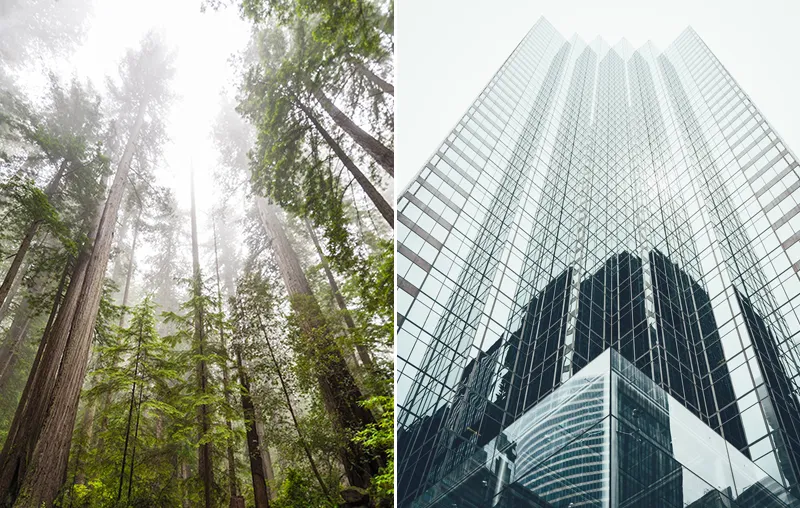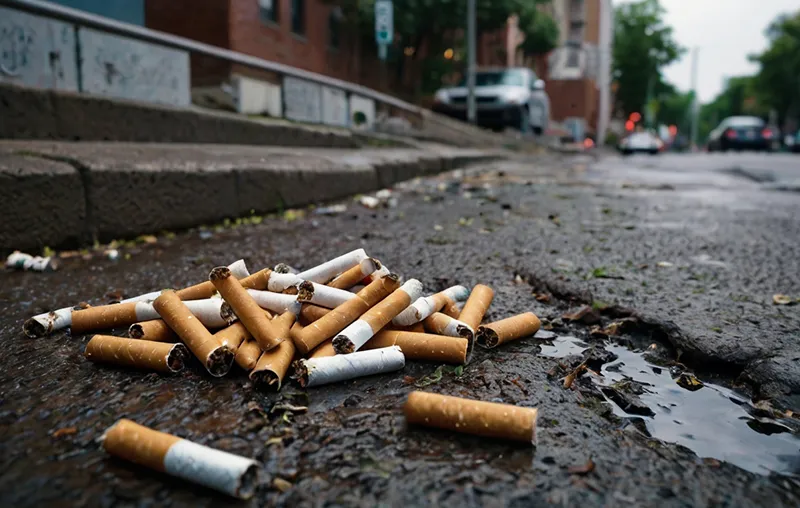What exactly is sustainable economic growth? And can sustainability, environmental protection and economic progress be reconciled at all, or do they contradict each other? If you're looking for answers to these questions, you've come to the right place.
We are doing pretty well. Technical progress makes our everyday lives easier and fewer and fewer people in the world have to go hungry.1 But apparently we are doing so well, especially in the Western world, that our economic system is the planet to its breaking point and widening the gap between rich and poor. This cannot go on indefinitely.
But it will be possible for us to live together on this planet without destroying it, won't it? Of course. The situation we have maneuvered ourselves into is not (yet) hopeless.
In this article, I would like to show you what lies behind the concept of sustainable economic growth, what the arguments are for and against it, and how environmental protection and progress can be combined in the future. Let's go!
Here you can find a short overview in advance:
Definition: What is meant by economic growth and sustainability?
First of all, let's take a look at what the terms that are decisive for this article actually mean. From this, we can ultimately also derive a Derive definition for sustainable economic growth.
Sustainability
If something is sustainable, then it basically has a for longer lasting effect. The term "Sustainability" has its origins in forestry and meant that no more wood should be felled than can grow back.
Today, this is understood to mean above all the Triad of ecological, economic and social responsibility. The point is to natural resources of the earth in such a way that they will still be available to future generations to the same extent.
Economic growth
Economic growth describes the Increase in gross domestic product (GDP) of a country over a specific period of time. It expresses the sum of all economic goods (goods and services) produced in an economy2 and provides information on how their economic performance is developing.
Therefore, GDP is considered one of the most important Indicators of prosperity and progress of a country.
Sustainable economic growth
Sustainable economic growth is understood to mean the economic growth of a country that is designed for the long term taking into account ecological, social and economic aspects.
The future-oriented concept of sustainable economic growth finds a Balance between progressive, economic development and the conservation of the planet's resourcesso that future generations will also benefit from the same or even better living conditions.
Tip: Definitions for the most important Technical terms from the subject area of sustainability by the way, I have compiled for you in the linked article.
Key question: Are sustainability and economic growth compatible or a contradiction?

The question of whether sustainability and economic growth are compatible or generally mutually exclusive will be controversial discussed from all sides. Can Infinite economic growth on a finite planet be possible at all?
Here, I'd like to first give you an overview and list my personal arguments and initial thoughts for and against compatibility.
Main arguments FOR compatibility
The following aspects give courage and hope for the future:
- Green technologies and innovations: Investments in renewable energies, recycling of raw materials and environmentally friendly technologies also generate growth and many new jobs.
- Long-term perspective: Sustainable growth can be more stable and long-lasting because it arises healthily and naturally and is based on durable, unlimited resources.
- New markets and business models: The growing demand from consumers for environmentally friendly, sustainable, fair products and services opens up new business opportunities and increases the will to offer such goods.
- Risk mitigation: Companies that are intrinsically motivated to operate sustainably prevent economic risks such as raw material shortages, environmental regulations or reputational damage.
- Efficiency improvement: By implementing sustainability strategies, businesses operate with greater efficiency of their resources, reducing their costs.
Main arguments AGAINST compatibility
The following things tend to suggest that infinite economic growth and sustainable action are rather contradictory:
- Short-term costs: The transition to more sustainable business practices often requires high investments before financial benefits accrue. The sole incentive of "sustainability" may not be "sexy" enough from an economic perspective.
- Limited resources: Steady growth on a finite planet could run up against physical and ecological limits if, for example, raw materials run out or free land areas are lacking.
- Short-term focus: Many companies and politicians are focused on quick profits and short election cycles. This inhibits long-term investment in sustainable development. In business, for example, the result is Greenwashing more likely.
- External Costs: The real costs of negative environmental impacts are not included in the prices of the products causing them: Accordingly, environmentally harmful products are often still cheaper than sustainable alternatives.
Compatibility: Why do economic growth and sustainability not yet go hand in hand? And how can the economy become more sustainable?

I myself am not an economist. But the co-founder of the "Scientists4Future" initiative, political economist Maja Göpel, gives in her Book "Rethinking Our World (you get here*) clear answers to these questions.
In the following I try to summarize the content briefly and concisely, to give you a Greater awareness of the problems and opportunities of the interplay between economic growth and sustainability to convey.

Reasons: We live in a comfortable illusory reality at the expense of others
Our economic system is not yet sustainable for a variety of reasons. Mainly because, because we live in a comfortable illusory realityin which we pretend that we can manage with endless resources.
But this is not the case with oil, natural gas and coal, for example. We have known since the seventies almost all that we know today about climate change. And yet, since then, we have basically continued to act exactly as before - preferring to build robotic bees for the Plant pollinationinstead of protecting the insects.
In addition, we live with a acquired egoism and are primarily interested in their own advantage. Unfortunately, selfishness rarely leads to prosperity for all.
Furthermore, constant economic growth also generates inequality. For example, the curves for the amount of CO2 in the atmosphere and global economic output basically lie on top of each other. We people in the industrialized nations thus ultimately live at the expense of other, poorer people (Keyword Externalization of environmental costs), which are already suffering massively from the climate change suffer.
Although our economy is becoming more efficient (e.g., lower energy consumption of technology) the Earth Overshoot Day (the day when we have used more resources than we are entitled to) is getting closer and closer to the beginning of the year.
This is due, among other things, to the Rebound effect. A good example of this is the VW Beetle, whose successor, the VW Beatle, still consumes just as much gasoline as the car from the fifties. The Potential savings from efficiency improvements were not realized, because, among other things, design, performance and comfort for industry and consumer:inside are the priority.
These are all just a few of many reasons for the fact that economic growth and sustainability do not yet harmonize with each other.
Tip: If you want to absorb knowledge from books more quickly, you should regularly look at Book summaries via Blinkist* read through. The app compactly summarizes the content of countless non-fiction books and saves you an enormous amount of time.
Future perspective: Redefining the concept of prosperity, rewarding sustainable action
We need to understand that our planet's resources are limited - and that we must Choice between sustainable economy or (soon) no economy at all anymore have
The concept of prosperity needs to be overhauled so that we can move away from the short-term, greedy "higher, faster, further" to a "Growth with sense and reason" can pass over. Prosperity also means that everyone (including the environment in which we live) and not just some people are doing well.
In order for more people to think and act in solidarity, we fundamentally need a system that Promotes charitable behavior and inhibits selfish action. So incentives are needed, such as clear competitive and cost advantages. The Fairphone company, which produces sustainable smartphones, is a good example of how this can work.
Technological innovations (e.g. the more efficient use of renewable energies) make sense - but will not shape growth in a truly sustainable way until they have completely replaced conventional energy sources, such as coal and gas - and not just supplemented them.
We can't get around it at all, to learn to do without some growthin order to act more sustainably. In the end, that is precisely what social progress is all about.
If there is no other way, a state must be able to protect our most important common good, an intact environment, e.g. with the help of Subsidies or bans (e.g. ban on single-use plastic). In this way, everyone ultimately benefits - and not just individuals.
The ecological challenges of our time can ultimately also only be international cooperation be solved. A global fund, into which mainly rich countries pay because their economic output emits particularly high levels of CO2, could compensate developing countries financially and thus motivate them to act more sustainably. After all, industrialized nations like Germany have also lived at the expense of the environment for many decades.
Recommendation: Do you also want to help shape the economic future professionally? Then, for example, the master's program "Business Management" the ideal contact point for you!
The Idea of eternal growth and achieve sustainable economic growth
At the center of the debate on sustainable economic growth is the Question of how we want to live as a global society in the future. A pure growth orientation obviously leads to (irreparable) damage to our planet. Every one of us must have understood that.
We must have a Aim for sustainable, economic growth that ultimately benefits everyone. The environment, politics, the economy and consumers. Each and every one of us can make a contribution - whether through conscious consumption, support for sustainable companies or political commitment.
"The world has enough for everyone's needs, but not everyone's greed."
Mahatma Gandhi (more at Sustainability Quotes)
Do you have any questions, suggestions or would you like to share a few thoughts on sustainable economic growth? And what does prosperity mean to you personally? I look forward to hearing from you in the comments.
Stay sustainable,

PS: As a consumer, you can also make a big impact through conscious investment. How to invest your invest sustainably and what you do with it, you'll find out next in the linked blog article.
References
- C. Winterbach; G. Mingels: More and more people are getting fed (as of 19.03.2017), available at https://www.spiegel.de/wirtschaft/soziales/immer-mehr-menschen-werden-satt-obwohl-die-weltbevoelkerung-zunimmt-a-1132731.html. [25.10.2023]. ↩︎
- Federal Ministry for Economic Affairs and Climate Protection: Economic Growth, available at https://www.bmwk.de/Redaktion/DE/Artikel/Wirtschaft/definitionen-02-wirtschaftswachstum.html. [25.10.2023]. ↩︎








